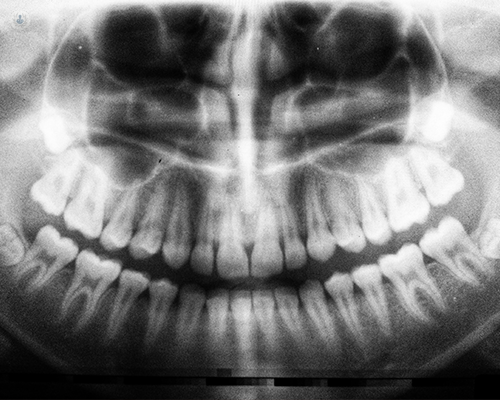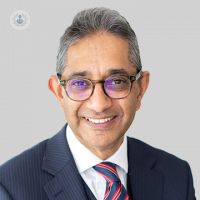Oral and maxillofacial surgery Covid-19
Autore:Oral and maxillofacial surgeries can still go ahead during the COVID-19 pandemic – depending on their urgency and the state of the crisis as the situation develops. Learn from oral and maxillofacial surgeon Mr Bhavin Visavadia about the symptoms that require an urgent medical consultation and which conditions require emergency treatment. He also clarifies the measures being taken to ensure your safety as much as possible in clinics and during surgery.

Which oral and maxillofacial surgeries are prioritised during the COVID-19 crisis?
We have prioritised surgeries on a national scale with emergencies cases being the category that has gone ahead throughout lockdown. Other surgeries will go ahead later depending on their urgency and the development of the pandemic. The categories are:
- Emergency/urgent cases - this involves patients who need surgery within 24 to 72 hours
- Patients who can wait up to four weeks for operations
- Patients whose surgery can be delayed up to three months
- Patients whose surgery can be delayed for more than 3 months
Prioritising has allowed us to really push what we can do in the coronavirus COVID-19 scenario. To be considered an emergency, patients generally need to have:
- Dental trauma or facial trauma
- Infection
- Severe pain
- Mouth cancer or suspected cancer – anyone who is worried about an ulcer or growth within the mouth, or a face or neck lump, should seek consultation immediately.
Cancer can be aggressive, so we’d like to see patients as soon as possible. Usually, GPs and dentists refer patients urgently for oral and maxillofacial specialists to assess, but as dentists have been closed, patients are less likely to visit their GP and we’ve seen those referrals really drop down. Some patients may be sitting on cancer-related symptoms but we need them to seek medical help as soon as possible. I and other oral maxillofacial surgeons have still been able to perform cancer operations throughout the crisis – please remember that help is still available.
Which oral and maxillofacial surgeries can be postponed without risk?
When it comes to procedures that could be postponed, before putting things off it’s sensible to get advice using e-Consultation (you can organise an e-Consultation with Mr Visavadia) or via a phone consultation.
Among the procedures that can be postponed are:
- The removal of a benign lump of the soft tissues.
- Removal of retained roots of teeth.
- Wisdom teeth removal.
- Cysts in the jaw.
For example, if you have an infection due to a non-urgent issue, a specialist might recommend antibiotics until your procedure can be rescheduled.
What measures are being taken to minimise the risks of catching COVID-19 during clinic visits?
As of June, we’re now opening up clinics. Things are changing all the time and there is a recovery plan in process. We needed clinic beds for critical care during the pandemic, so the recovery plan involves putting them back to regular use. However, if we see another spike in COVID-19 cases, we could lose some of our resources again (staff, beds, etc.).
We’re being very careful in how we plan and do things:
- We’re offering remote consultations to reduce face-to-face consultations, particularly for those who are shielding.
- We’re implementing a risk assessment – this involves asking patients if they’ve had coronavirus symptoms i.e. a high temperature or cough. If they do, they won’t be able to attend.
- · Patients who need to attend the clinic are pre-booked at a specific time to have a safe flow of patients in the clinic at one time.
- Visitors to the clinic will have their temperature taken and may be asked to wear PPE: gloves, mask, visor etc. as appropriate.
- Patients should clean their hands and sanitise . They’ll spend the minimal amount of time inside the clinic.
What measures are being taken in the operating room?
Before any inpatient surgery, patients will have a pre-assessment and will need toisolate for 14 days. They may also be tested for COVID-19. We’ve organised our teams to offer safe and secure treatment with full PPE. Unfortunately, patients may need to attend on their own and visitors are not allowed currently (as of 12/06/20).
If a patient's treatment is postponed, is there temporary treatment until they can have their surgery?
If a patient needs their treatment urgently, they will get it. If patients have no urgent symptoms but are worried, they can check in with their clinic via email and we’ll call back to reassess if temporary treatment is needed.
If the issue is something straightforward, a dentist may be able to help in a non-urgent setting. If symptoms persist, we would manage those using full COVID precautions.
Risk of oral surgery
Oral surgery does pose a higher risk of contracting COVID-19 due to Aerosol Generating Procedures (AGP). If you come to a dentist or oral surgeon, the virus droplets are theoretically carried around the air by AGP and the use of PPE is vitally important to minimise this risk
If you are going to attend a surgical appointment with an oral and maxillofacial surgeon, clean your teeth and use antiseptic mouthwash beforehand.
For consistently up-to-date and reliable information regarding COVID-19, be sure to check the NHS website.
The pandemic doesn’t have to limit your access to expert medical advice – visit Mr Visavadia’s Top Doctors profile to book an e-Consultation and receive his help from the safety of your own home.


